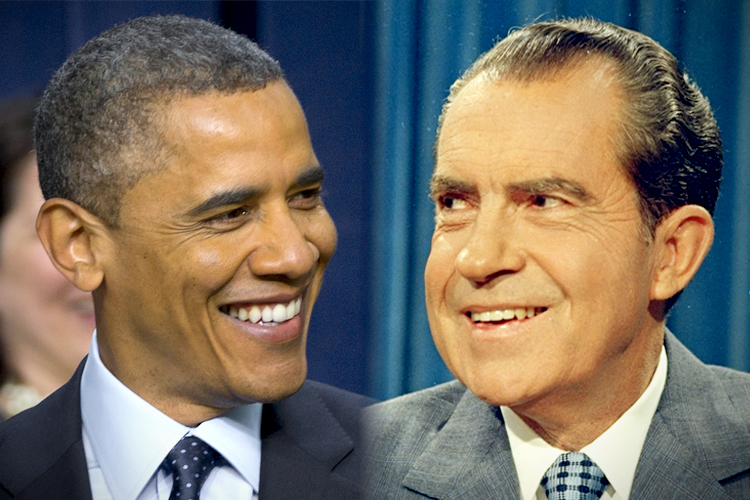Other than reflecting a partisan assailant’s lack of creativity, Nixon metaphors and -gate suffixes are so overused in politics that they now most often mean almost nothing. Yes, to call someone “Nixonian” or to invoke Watergate in naming a scandal is typically less a serious substantive critique of an opponent than a reflection of the critic’s laziness and stupidity.
“Most often” and “typically,” though, are the operative words these days. While I’m obviously hesitant to invoke the 37th president terms for the aforementioned reasons — and while I agree with my Salon colleague Alex Pareene and my pal Steve Almond that the IRS and Benghazi brouhahas most certainly do not warrant Nixon references — I do believe Nixon’s legacy is nonetheless applicable to the revelations about the Obama administration’s posture toward press freedom.
Those particular revelations, of course, aren’t happening in a vacuum. Instead, they relate to an administration whose known obsessions suggest this is part of a larger, dare I say Nixonian, pathology — one defined by a hostility toward the most basic democratic ideals.
The latest revelation, of course, is the stunning news that the administration spied on Fox News’ national security reporter James Rosen and deemed him a “co-conspirator” for trying to report on the United States’ North Korea policy — that is, for the alleged crime of simply doing the job that any national security reporter is supposed to do. This follows:
- News that the administration seized two months of phone records from the Associated Press. According to the AP, the “massive and unprecedented intrusion” was likely part of the administration’s attempt to punish the news organization and its sources for a 2012 report “about a foiled terror plot” in Yemen.
- News that the Obama administration is, in the words of the Nation magazine, waging a historically “unprecedented crackdown on whistleblowers” — one in which the administration seems far more interested in prosecuting those leaking incriminating information to the press rather than in stopping the crimes being disclosed. As veteran Foreign Service officer Peter Van Buren recently put it: “While (the Obama administration) has pursued no prosecutions against CIA torturers, senior leaders responsible for Abu Ghraib or other war crimes, or anyone connected with the illegal surveillance of American citizens, it has gone after whistleblowers and leakers with ever increasing fierceness, both in court and inside the halls of various government agencies.”
- News that Obama administration officials regularly require reporters to let them approve — or disapprove — quotes for publication in exchange for access to sources.
- News that President Obama conducted the fewest first-term press conferences — and thus subjected himself to the fewest opportunities for unscripted questions — of any president in a quarter century. This followed a report from Townson University political scientist Martha Joynt Kumar showing that “Obama held only 107 brief question-and-answer encounters with the media in his , first four years, compared with 354 by George W. Bush in his first term.”
- News that the White House threatened to bar a San Francisco Chronicle reporter from future presidential events because in her reporting she posted a video of protesters demonstrating against President Obama’s prosecution of whistle-blower Bradley Manning.
- News that the Obama administration has amassed a worse record of fulfilling Freedom of Information Act requests than even the awful Bush administration. Said one lawyer who specializes in FOIA requests: “Obama is the sixth administration that’s been in office since I’ve been doing Freedom of Information Act work … It’s kind of shocking to me to say this, but of the six, this administration is the worst on FOIA issues. The worst. There’s just no question about it.”
Context, as alluded to, is key to understanding the collective meaning of the Obama administration’s hostility toward press freedom, and the relevant context suggests these actions are neither unrelated nor merely a product of unplanned negligence.
Recall that for years, Obama and his aides have let it be known that above all else, they value loyalty and message discipline.
McClatchy newspapers said that works in practice as “a penchant for secrecy finely honed during a disciplined campaign.” The UK Telegraph said Team Obama’s campaign was “tightly controlled, with very few uncoordinated leaks.” The AP called it “ironclad discipline” that involves “carefully choreographed interactions with the press”; that is “marked by a ‘No-Drama Obama’ credo”; and that is run by staffers who are rewarded by a “strong loyalty to their man’s message.”
Put these two realities together — juxtapose the Obama administration’s abhorrent record on press freedom with its macho attitude about message discipline — and you see that this is all part of one larger story about this administration’s core priorities. Indeed, as the Washington Post’s Chris Cillizza summarized it, “Obama and his top campaign aides prided themselves during the 2008 and 2012 races for their tight-knittedness and their lack of leaks.” That means that “while Obama’s senior team insists these decisions (to target the press) were made independently of him, there’s clearly a tone being set from the top down — and it’s a tone that Obama has long held, dating back to his days as a candidate.”
This is why in this particular case the term “Nixonian” isn’t (as many Democratic partisans hope) just a meaningless epithet. Unfortunately, it is entirely appropriate because it seems to describe an administration-wide ideology” — and the attendant consequences that inevitably accompany such an ideology.
Like Nixon and the tough-talking paranoiacs around him who foremost valued loyalty and loved the idea of punishing anyone who was off-message, Obama and his staff have let it be known that they pride themselves on an obsessive compulsive — read: Nixonian — devotion to a similar “enemies list” mentality when it comes to dealing with the press.
And just like Nixon’s decision to prioritize loyalty and vindictiveness against dissenters and whistle-blowers resulted in infamous abuses of power, so too have Team Obama’s comparable obsessions now resulted in similarly destructive abuses.

